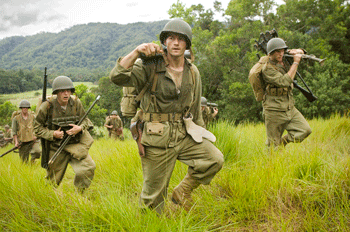There is a scene early in “The Pacific,” the ten-part miniseries that debuted on HBO on March 14, in which the filmmakers acknowledge the shadows that loom over their production. Sydney Phillips, a Marine from Alabama, is aboard a small craft about to land on the remote island of Guadalcanal. He and his comrades sit in somber silence, some in prayer, as they prepare to storm the beaches and face the enemy.
The scene will be familiar, of course, to anyone who has seen the first thirty minutes of “Saving Private Ryan,” which portrayed the Allied landing at Normandy in gory detail. Yet once “The Pacific” nods in the direction of its esteemed predecessor, it makes a quick pivot, as if to remind viewers that we are not in the European theater. For when the Marines land at Guadalcanal, guns at the ready, they do not encounter the dreaded “Jap,” but a slew of other Marines, basking in the South Pacific sun. This battle, at least, would not be fought on the beaches.
Unfortunately, this kind of playful homage is all too rare in “The Pacific,” which like HBO’s earlier World War II miniseries, “Band of Brothers,” hails from the producing team of Steven Spielberg and Tom Hanks. The filmmakers generally approach their task with the utmost seriousness, intent on recounting the horrors of this forgotten chapter of World War II. Yet as it undertakes this grim enterprise, “The Pacific” too often strikes a somber note and never fully escapes the anxiety of influence at the heart of this endeavor.
Like “Band of Brothers,” “The Pacific” wisely chooses to profile the soldiers in the trenches instead of the war’s commanders. Philips (Ashton Holmes) and Robert Leckie (James Badge Dale) are members of the marine infantry. John Basilone (Jon Seda) is a sergeant who has returned to fight in the Pacific after a pre-war tour in the Philippines. After the marines’ victory in Guadalcanal, Philips and Leckie leave for brief reprieve in Australia and then onto Peleliu, a rat-infested island that saw some of the worst fighting of the war. Basilone, a medal-winner for his bravery, is sent back to the States to promote the sale of war bonds. Later episodes, which were not available for review, portray the fighting in Iwo Jima and Okinawa.
That the series’ principal characters hardly know one another, and leave for separate assignments after the second episode, is the series’ besetting sin. Where “Band of Brothers” had a natural narrative spine—Stephen Ambrose’s riveting account of Easy Company’s trek from Normandy to Berlin—“The Pacific” works with shards of stories. They are good stories, to be sure: the filmmakers use journals by Leckie and Eugene Sledge as their founding texts. After serving in the Pacific, Leckie went on to become a military historian, and published his wartime account, A Helmet for My Pillow, in 1957. Sledge’s With the Old Breed has been hailed for its gritty portrayal of battle. Stitching these stories together was surely a challenge, made all the more difficult by the vast canvas that was the Pacific theater. The result is a film impressive in scope but absent the compelling narrative thread an epic story requires.
Despite these failures, however, “The Pacific” still commands attention. Sledge’s and Leckie’s first-hand reports lend the series a realistic, unfiltered feel, and the series is notable for its refusal to romanticize battle. The shots of Sgt. Basilone, firing on line after line of Japanese soldiers, are an effective reminder of what it took to defeat the Japanese enemy—and the ghosts the veterans lived with long after V-J Day. Later, when we see the enemy burrow deep in to the coral ridges of Peleliu, refusing to surrender, we glimpse the fanaticism that contemporary military leaders must reckon with.
At times, “The Pacific” revels in the horror of combat, and one later episode is unrelievedly grim. Watching a soldier pry a gold tooth from a dead Japanese fighter is suitably shocking, but how often must the scenario be replayed? And is it necessary to present what can only be described as a soulless American soldier, tossing pebbles into the sheared skull of his enemy? An argument can be made that yes, we should witness these scenes, if only to give us pause before setting out to war again. Yet by disturbing the viewer in this way the filmmakers risk alienating their audience. Worse yet, in their search for gravitas they too often leave humor by the wayside.
The portrait of Pfc. Eugene Sledge is particularly humorless. Sledge entered the war late, against the wishes of his father, a doctor. Dr. Sledge tended to veterans of World War I, observing first hand the effects of battle trauma, and worries for his son. As the series unfolds, Dr. Sledge’s anxieties come to fruition in an all too predictable manner. Sledge's skin turns deathly pale and his eyes glaze over. Before long, he too is hunched over a Japanese soldier’s open mouth, knife in hand.
What finally makes “The Pacific” worth watching, though, isn’t the narrative, but the opportunity to observe the genesis of a new global order. One cannot make a film about the Pacific theater, after all, without the specter of the atomic bomb pressing in on every frame. So as the Japanese soldiers fight to the death in Peleliu, astute viewers may be reminded of Gen. Douglas MacArthur, whose staff argued that a land invasion of Japan would result in tens of thousands of U.S. casualties. And in the brutal conduct of the American soldier, who demonizes the “Japs” as less than human, there are signs of the fierce will to win that ended in Hiroshima and Nagasaki.
In a poem written during a rare moment of quiet, Robert Leckie meditates on the “the hero's holocaust” at Guadalcanal. Given the era, the choice of such a fraught term seems intentional, and one of the implicit questions raised by “The Pacific” is whether the slaughter of the Japanese constituted a holocaust. The question is not easily answered, but it is inarguable that the dropping of the bomb marked the birth of something wicked indeed. For all its flaws, “The Pacific” is a searing depiction of the twentieth century as it groaned in labor pains. We live with that war’s legacy even now.









I believe the U.S. was justified in dropping the bombs on Hiroshima and Nagazaki because of the fanaticism demostrated by the Japanese soldiers' willingless to commit suicide before surrendering and the Kamikazi pilots plunging into the U.S. naval ships especially in Iwo Jima. The prospects of invading Japan with ten of thousandths dead Americans was just unthinkable. I believe that this course of action can be justified within the moral framework of a just war.
Although living in a Navy-impacted small town, with hundreds of military families in our neighborhoods and Church... with all the attendant sacrifice of their lives... This movie review was welcomed by me, because of our tendency to "sterilize" WW2 (thanks to Tom Brokaw?) The impact of the world wars has changed humankind's relationships to each other forever... and our thinking on the matter (this sterilization) has warped us beyond belief! A psychoanalyst friend of mine also stated, she is quite certain the incidence of childhood sexual and other abuse was greatly increased after these wars... which leads to the inevitable war-characters we have become to each other. My darling father, a casualty, I love you for what you have made of your life... in spite of the atrocities you faced at Normandy! Deep in my heart, I honor all those holding such trauma deep in their souls-"to protect the innocent".
My grief is exponential-think of that of our God!
From a dramatic and literary perspective, I can understand Mr. Reidy's criticism of the "humorlessness" of The Pacific, and perhaps also the absence of narrative cohesion, moreover character cohesion, of the sort we get to enjoy in, say, Band of Brothers (the title itself tells us to expect as much). Yet, as a combat veteran, I find something fundamentally immoral to Mr. Reidy's criticism. No less so as a veteran who writes, and writes dramas, about war.
Reidy states: "The result is a film impressive in scope but absent the compelling narrative thread an epic story requires." Which is to say, the representation of war must conform to our "epic expectations," which, unfortunately, is not to represent war at all, or anything else for that matter, but rather to forge fictions preemptively submitted to a stock assortment of dramatic desires. What happens when war itself fails to meet such expectations? Another real part of war is the constant fracturing of relations, whether through death or reassignment, precisely of the sort depicted in The Pacific. This fracturing is itself a form of violence that issues from warfare's demand for expediency.
I knew the "band" mythology, of the brotherhood of war, before I saw the miniseries, which was before I deployed to Iraq. Some of this myth conformed to my wartime experiences. Much of it did not. (Romanticism always seems to haunt our aspirations of realism.) In the case of Band of Brothers, one of its romanticisms is the belief that the brotherhood of war is capable of transcending moral and spiritual consciousness, that there is something so fundamental to political violence as to transcend even Christ and His Kingdom, which knows no political interest.
War is fundamentally different to the soldier who believes death should only be feared by those who fail to love God and neighbor; to the soldier who comes to see countries as meaningless in the face of the Kingdom of God; to the soldier who does not fear death but even welcomes it, for belief in Christ's gift of immortality. When failure to love all, especially enemies, is the soldier's gravest of fears, war is a fundamentally different reality. A profoundly alienating reality. A reality sublimely elided by Band of Brothers. I have never seen a film that even supposes the possibility of such a reality. (Which is, itself, a testament to the deep perversion of our psychological imagination, not to mention lack of faith.)
Reidy, it seems, is not yet interested in representations of war, so much as "war." So long as the expectations of genre, whether epic or tragedy or whatever, are given priority to the demands of representation itself, our artistic imagination will remain hopelessly romantic. Artists must always be aware, gravely aware, of the degree to which their art alienates an audience. But no less so to the degree that it pleases an audience. Jesus didn't tell us to pick up our predispositions, but our crosses. We must allow our predispositions to be crucified. Much like the prophet, is this not also the role of the artist?
Nothing perhaps has more stunted the popular martial imagination than the cliche "war is hell." We assume it. Which means we forget it. And then we return to the business of writing nice scripts that represent nothing other than the desires we have failed to question.